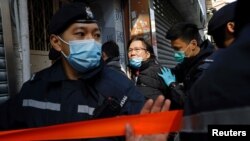The aftermath of the 12 Hong Kong activists who fled the city and were detained in Mainland China continued last week, with the release of Hong Kong lawyer Daniel Wong Kwok-tung after 40 hours in police custody.
Wong, 71, was arrested along with 10 others over allegedly helping Hong Kong activists flee the city in August. Wong told a local media news conference he was “perplexed” about why he was arrested.
“I will remain standing in my role, with my expertise, do what I ought to and what I deeply believe in,” Wong said as he was released on bail.
On August 23, 12 Hong Kong activists facing criminal investigations in relation to anti-government protests, were detained at sea by Chinese authorities under suspicion of illegal border crossing after attempting to flee Hong Kong by boat for Taiwan. All were taken into detention in mainland China.
On December 30, ten of the twelve activists were sentenced to jail terms in Shenzhen, China, ranging from seven months to three years imprisonment. The two youngest detainees were sent back to Hong Kong.
During their detention, families of those detained were not allowed to visit, while Chinese authorities reportedly prevented family appointed lawyers as their legal representation.
Human rights organizations in Hong Kong said these were examples of human rights violations.
Du Song, Executive Director of the Chinese Human Rights Lawyers Concern Group (CHRLCG), said the detainees have faced “unjust treatment in the legal process.”
“They cannot appoint their own lawyers, the family cannot meet the detainees and the officials fully utilized the criminal procedure law and the border control during Covid19 as a means to bar the family from the hearing,” Song told VOA.
“We found the mentioned are not meeting the international human rights standard at all,“ he said.
The case comes at a time of further scrutiny of the legal system in both Hong Kong and China.
Last week, a Chinese human rights lawyer, who handled the case of the 12 activists, recently had his licence revoked. Lu Siwei, was one of two human rights lawyers selected by the families but was not recognized by Chinese authorities and denied access to the defendants.
And earlier this month, U.S. human rights lawyer John Clancey was one of 55 people arrested in Hong Kong over links with democratic primary elections in July.
Song believes the future of Hong Kong’s legal system is under threat amid the implementation of a controversial national security law and pressure from Beijing.
“Sentence by vague articles in the national security law, it is not fulfilling any word of ‘one country, two systems.’ The time now is the darkest time of Hong Kong’s judicial system. Lawyers’ rights in Hong Kong might be an important issue one day,” he added.
After Britain handed back Hong Kong to China in 1997, the ‘one country, two systems’ agreement was signed allowing Hong Kong a ‘high degree of autonomy’ until 2047. The city has freedoms unseen in Mainland China, which is governed by the Chinese Communist Party (CCP).
After Hong Kong’s anti-government protests in 2019, Beijing enacted the national security law, prohibiting violations such as subversion, and succession. The law carries maximum sentences of life imprisonment and has been the catalyst for a political crackdown in the city. Street protests have stopped whilst the activists have been arrested, jailed or fled the city.
Hang Tung Chow, a Hong Kong barrister and Vice-President of the Hong Kong Alliance, believes that the problem is the 12 activists were prosecuted in the first place.
“The usual cases is to send them back after some administrative detention, that wouldn’t last more than 15 days.
I think they (authorities) wanted to make an example of these people, to intimidate the Hong Kong people from doing this sort of thing again,” Chow told VOA.
Chow also believes Hong Kong residents in the city should be under no illusions about whom they are up against.
“I think Hong Kong people have to face up to the fact that it is now the Chinese authorities they are dealing with, not just the Hong Kong authorities. I would say it’s a call to reality,” Chow added.




